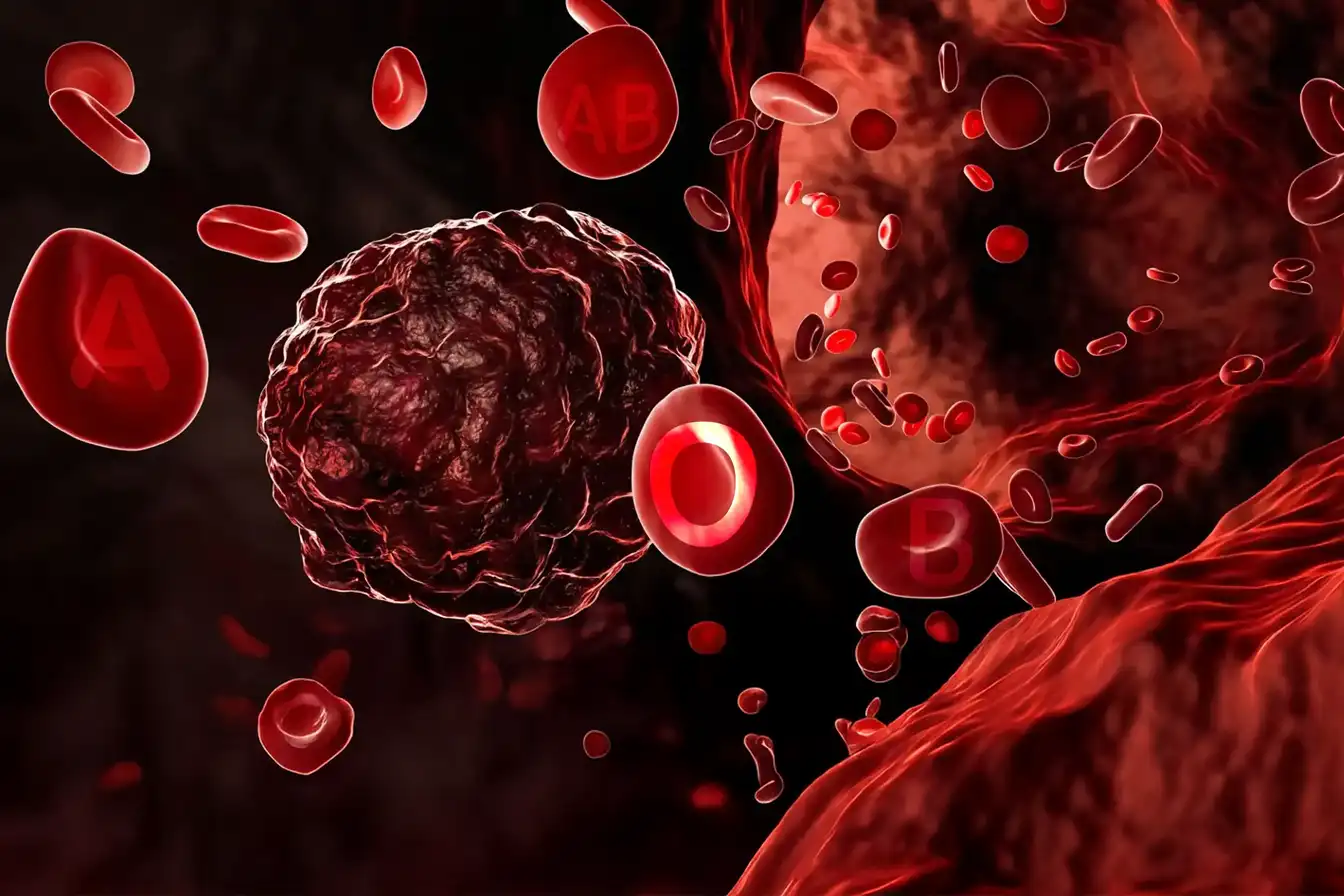Cancer remains one of the most formidable health challenges worldwide, touching the lives of millions each year. It’s not just a disease but a spectrum of disorders that can affect any part of the body, manifesting with various degrees of severity and outcomes. The global impact of cancer is profound, with it being the second leading cause of death globally. This pervasive disease results in approximately 10 million deaths per year, which accounts for nearly one in six deaths worldwide. The fight against cancer is not only about treatment but also about understanding its numerous risk factors, which can include everything from genetics and lifestyle to seemingly benign factors like blood type.
Recent scientific explorations have shed light on an intriguing aspect: the blood type cancer link. This research suggests that your blood type could influence your susceptibility to certain types of cancer. Each blood type—A, B, AB, and O—carries its unique blueprint that may impact everything from the immune system’s functionality to inflammatory responses, both of which are crucial in the body’s ability to fight cancer. Understanding this connection is not just about adding another layer to the complex cancer puzzle but about pioneering a path to personalized medical strategies that could one day lead to more effective prevention and treatment plans.
As we delve deeper into the connection between blood types and cancer risks, we are guided by a growing body of research that points to specific vulnerabilities and protections afforded by one’s blood type. This knowledge is not merely academic; it has practical implications that could guide future dietary recommendations, screening schedules, and even targeted therapies.
Here’s an image that captures the essence of this groundbreaking research:
In the following sections, we will explore how each blood type correlates with different cancer risks and what measures can be taken to mitigate these risks. By understanding the blood type cancer link, we can move towards a more informed and personalized approach to cancer prevention and care.
The Significance of Understanding Cancer
Cancer is a complex and multifaceted disease that arises from cells in a specific part of the body growing and reproducing uncontrollably. The resulting mass, or tumor, can either be benign (non-cancerous) or malignant (cancerous). Understanding the causes of cancer is crucial for developing strategies for prevention, diagnosis, and treatment. The role of awareness is not to be underestimated; it empowers individuals to make informed decisions about their health, potentially leading to early detection and successful management of the disease.
Causes of Cancer: Cancer’s causes are diverse and often interlinked, involving genetics, environmental factors, and lifestyle choices:
- Genetic Factors: Certain types of cancer are inherited genetically. Mutations in specific genes like BRCA1 and BRCA2 increase the risk of breast and ovarian cancers. Genetics can predetermine the susceptibility to cancer, but not all genetic mutations guarantee the development of the disease.
- Environmental Factors: Exposure to certain substances or environmental exposures can lead to mutations in our body’s cells. Carcinogens such as asbestos, certain chemicals, and radiation are known to trigger cancerous changes in cells.
- Lifestyle Choices: Smoking, excessive alcohol consumption, a poor diet, and lack of physical activity can all increase cancer risk. Lifestyle modifications can often significantly reduce the risk of certain types of cancer.
Importance of Awareness: Awareness plays a pivotal role in cancer prevention. Educating the public about the blood type cancer link and other risk factors enables individuals to take proactive measures. Regular screening, adopting a healthier lifestyle, and avoiding known carcinogens are all strategies that can diminish the risk of developing cancer.
Role of Genetics and Environment: The intricate relationship between genetics and environmental factors often dictates cancer development. For instance, a person may inherit a predisposition to a certain type of cancer, but environmental triggers such as smoking or exposure to harmful chemicals might be needed to actually develop the disease. Conversely, someone without a genetic predisposition might avoid cancer entirely, even with environmental exposure, depending on other protective factors in their lifestyle or physiology.
Understanding cancer involves not just looking at one factor but considering the complex interactions between genetics, environment, and individual choices. This holistic view is crucial for effective prevention and treatment strategies.

By comprehending these factors, individuals can better understand the blood type cancer link and other risks, taking informed steps towards a healthier future.
Exploring Blood Types
Understanding blood types is crucial in the context of transfusions, medical treatments, and as emerging research suggests, in assessing the risk of various diseases, including cancer. The system used to categorize blood based on the presence or absence of certain antigens is pivotal not just for safe transfusions but also for understanding genetic influences on health.
Blood Types Overview: There are four main blood types—A, B, AB, and O—determined by the presence or absence of antigens and antibodies in the blood:
- Type A: Has A antigens on the surface of red blood cells and B antibodies in the plasma.
- Type B: Has B antigens with A antibodies in the plasma.
- Type AB: Has both A and B antigens but no antibodies. This makes AB the universal recipient for transfusions.
- Type O: Has no antigens but both A and B antibodies, making it the universal donor.
Each of these blood types can further be classified as positive or negative, based on the presence of another antigen, the Rh factor, which is critical for determining compatibility in blood transfusions and during pregnancy.
Determining Blood Types: The determination of blood types is genetically based, originating from the genes inherited from one’s parents. The ABO blood type is determined by the ABO gene, which varies among different individuals. The presence or absence of specific molecules, A and B antigens, on the surface of red blood cells, defines one’s ABO blood type. For example:
- An individual inherits one gene (A or B or O) from each parent, and the combination of these genes determines the blood type.
- The gene O is recessive; thus, two O genes are needed for a person to have blood type O.
- Conversely, the A and B genes are dominant, so any combination involving A or B results in these antigens being expressed.
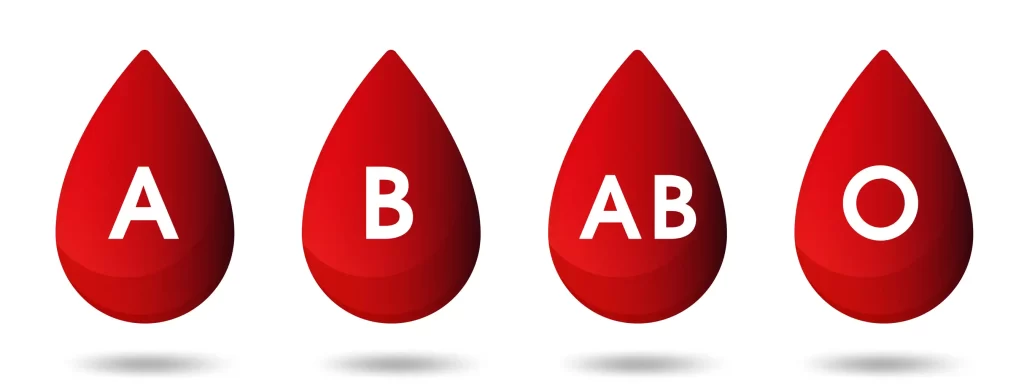
This fundamental understanding of blood types through the blood type cancer link enhances our grasp of how these genetic markers could potentially influence cancer risk. In the subsequent sections, we’ll delve deeper into how specific blood types may correlate with increased or decreased cancer risks, underscoring the importance of genetics in disease prevention and management.
Blood Type and Cancer Susceptibility
The intriguing link between blood types and cancer susceptibility has been a subject of study in numerous research projects, including the significant Shanghai Study. This exploration into how genetic markers like blood types can influence cancer risks presents a compelling dimension to preventive health strategies.
Analysis of Blood Types and Cancer Risks:
- Type A: Individuals with blood type A have been found to have a higher risk of stomach cancer. Studies suggest this may be due to the presence of specific antigens in gastric tissues that foster a favorable environment for the bacteria Helicobacter pylori, a known carcinogen for stomach cancer. Moreover, type A individuals might also face increased risks for pancreatic cancer.
- Type B: Those with blood type B are at a heightened risk for pancreatic cancer. The reasons behind this correlation are still under investigation but may involve complex interactions between dietary factors and the genetic expression of blood type antigens.
- Type AB: Blood type AB carries a higher risk for pancreatic cancer and has also been associated with an increased risk for gastric cancer. This group’s genetic makeup combines factors from both blood types A and B, possibly accumulating the risks associated with each.
- Type O: Interestingly, individuals with blood type O, while generally having a lower risk of heart disease, tend to have a higher susceptibility to peptic ulcers, which can enhance the risk for gastric cancer. However, they often show a lower incidence of many other cancer types, which could be attributed to the protective effect of having both A and B antibodies.
Insights from the Shanghai Study: The Shanghai Study provided pivotal insights into how blood types might influence cancer susceptibility. It highlighted a correlation pattern where non-O blood types (A, B, AB) generally exhibited a higher risk of developing gastric and pancreatic cancers compared to blood type O. This large-scale study leveraged population genetics to illustrate the potential for tailored preventive measures based on one’s blood type.
Implications of Research: Understanding the blood type cancer link provides a foundation for targeted prevention strategies. For instance, individuals with blood type A might benefit from regular screenings for stomach and pancreatic cancers, while those with type O could focus on managing risk factors for gastric cancer.
This detailed analysis helps in painting a clearer picture of the potential genetic predispositions to cancer based on blood type. It underscores the importance of personalized medical approaches that could one day lead to more effective screening and prevention strategies tailored to one’s genetic profile.
Blood Type O: Lower Risk but Not Immune
Blood type O, the most common blood type globally, is often associated with certain health advantages, such as a lower likelihood of clotting issues and cardiovascular problems. However, when it comes to cancer, being type O does not confer blanket immunity, but it does influence the risk profile for specific cancers.
Cancer Risks for Blood Type O:
- Lower Risk: Research indicates that individuals with blood type O have a lower risk of developing pancreatic and gastric (stomach) cancers compared to other blood types. The mechanisms are not fully understood but may relate to the absence of the antigens found in other blood types, which are thought to provide a binding site for bacteria like Helicobacter pylori, a major risk factor for gastric cancer.
- Higher Risk: On the other hand, some studies suggest that blood type O may be associated with a higher risk of peptic ulcers, which are often precancerous conditions. The increased risk of bleeding in type O individuals may also complicate these conditions, potentially leading to more severe health outcomes.
Lifestyle Factors Contributing to Risks:
- Diet: The absence of protective antigens means that maintaining a healthy diet free of irritants and carcinogens is crucial for individuals with type O blood. Foods that reduce inflammation and promote gut health are beneficial.
- Stress Management: Stress has been linked to peptic ulcer formation; hence, effective stress management is crucial for those with blood type O to mitigate this risk.
- Regular Screening: Given the mixed risk profile, regular medical screening for early detection of peptic ulcers and related complications is advisable.
Preventive Measures:
- Healthy Lifestyle Choices: Engaging in regular physical activity and avoiding smoking can help reduce the overall cancer risk for individuals with blood type O.
- Dietary Adjustments: Incorporating a diet high in fruits, vegetables, and whole grains while avoiding processed foods and those high in added sugars can be particularly protective.
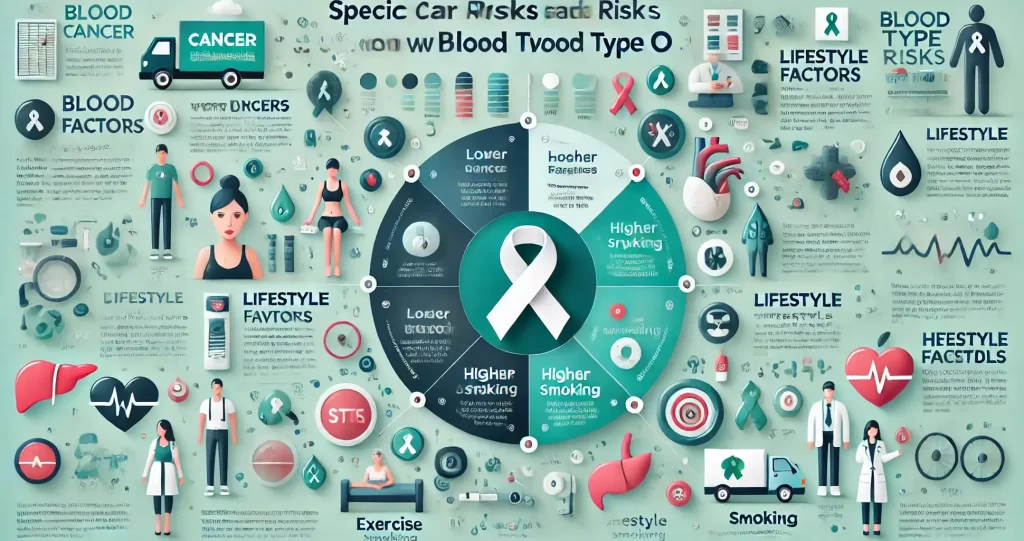
By understanding the specific vulnerabilities associated with blood type O, individuals can tailor their lifestyle and health monitoring to better prevent and manage potential risks. This proactive approach is crucial in turning the tide against cancer susceptibility linked to blood type.
Blood Type A: Higher Stomach Cancer Risks
Individuals with blood type A have a genetically higher risk of developing stomach cancer compared to other blood types. This susceptibility is influenced significantly by dietary factors, making it crucial for those with blood type A to consider specific dietary adjustments.
Connection Between Diet and Stomach Cancer Risk: Research has shown that blood type A’s antigen might facilitate a higher adherence of Helicobacter pylori bacteria to the stomach lining. This bacterium is strongly associated with stomach ulcers and cancer. The risk is further compounded by dietary choices:
- High-Salt Foods: Diets high in salt can damage the stomach lining, making it more susceptible to cancer-causing agents.
- Smoked and Processed Meats: These foods contain nitrosamines and other chemicals that have been linked to stomach cancer.
- Lack of Fruits and Vegetables: A diet low in fruits and vegetables lacks essential antioxidants and fiber, which help protect against cancer.
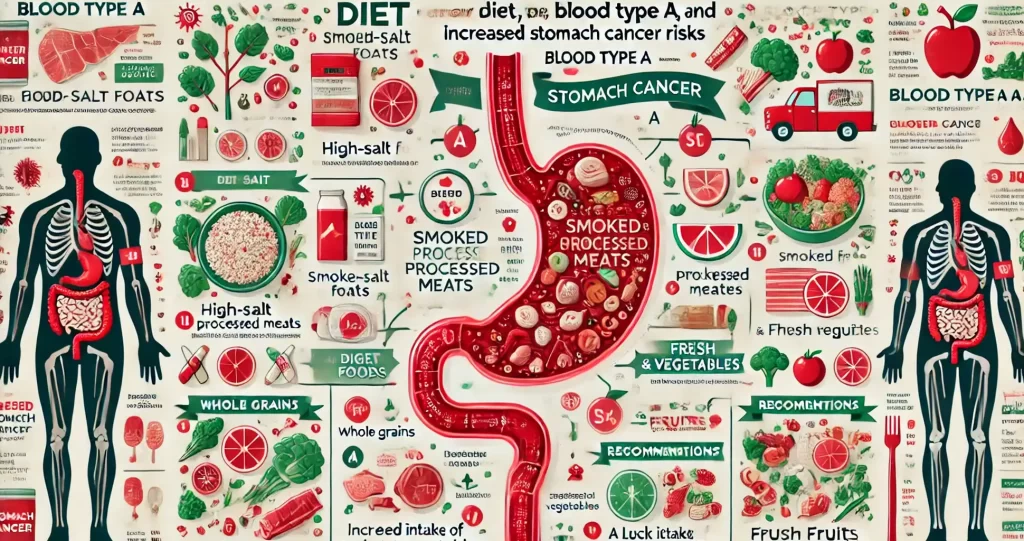
Recommendations for Dietary Adjustments: To mitigate the increased risk of stomach cancer, individuals with blood type A should consider the following dietary changes:
- Reduce Salt Intake: Limiting salt in cooking and avoiding high-salt processed foods can reduce the risk of stomach cancer.
- Increase Fresh Produce: Incorporating a variety of fruits and vegetables into the diet provides vital nutrients and antioxidants that combat cancer formation.
- Choose Whole Grains: Whole grains are rich in fiber, which helps maintain a healthy digestive system and reduces cancer risk.
- Avoid Processed Meats: Opting for fresh, lean meats over smoked or processed options can significantly reduce the intake of harmful carcinogens.
By adopting these dietary adjustments, those with blood type A can actively reduce their stomach cancer risk. Additionally, regular medical check-ups and screenings for Helicobacter pylori can further aid in prevention.
Blood Type B: Pancreatic Concerns
Individuals with blood type B may face a heightened risk of developing pancreatic cancer compared to those with other blood types. This increased risk is partly due to genetic factors linked to the blood type B antigen, which may influence the development of pancreatic cells and their susceptibility to cancerous changes.
Why Type B Might Have a Higher Risk of Pancreatic Cancer:
- Genetic Predisposition: The presence of the B antigen on the surface of red blood cells might interact with other cellular mechanisms that influence pancreatic health. Research is ongoing to fully understand how these interactions increase cancer risk.
- Immune System Interaction: Blood type antigens, including type B, are not only found on red blood cells but also on various body tissues, including pancreatic cells. These antigens can affect how the immune system recognizes and responds to abnormal cell growth, potentially leading to an increased cancer risk.
Suggested Dietary and Lifestyle Modifications: To mitigate the risk associated with pancreatic cancer for those with blood type B, the following dietary and lifestyle modifications are recommended:
- Increase Fruits and Vegetables: Consuming a diet rich in colorful fruits and vegetables ensures an adequate supply of antioxidants, which help reduce oxidative stress and inflammation—two factors linked to cancer development.
- Limit Processed and Red Meats: Studies have shown that high consumption of processed and red meats can increase the risk of pancreatic cancer. Opt for lean protein sources like poultry, fish, or plant-based proteins.
- Maintain a Healthy Weight: Being overweight or obese is a significant risk factor for pancreatic cancer. Regular physical activity and a balanced diet can help maintain a healthy weight.
- Avoid Smoking and Limit Alcohol: Smoking is a major risk factor for pancreatic cancer, and excessive alcohol consumption can lead to chronic pancreatitis, another risk factor for this type of cancer.
Additional Recommendations:
- Regular Health Screenings: Early detection can significantly improve the prognosis for pancreatic cancer. Regular check-ups and discussions with a healthcare provider about any unusual symptoms are crucial.
- Stress Management: Chronic stress can negatively impact the immune system and overall health. Incorporating stress-reduction techniques such as meditation, yoga, or regular exercise can be beneficial.
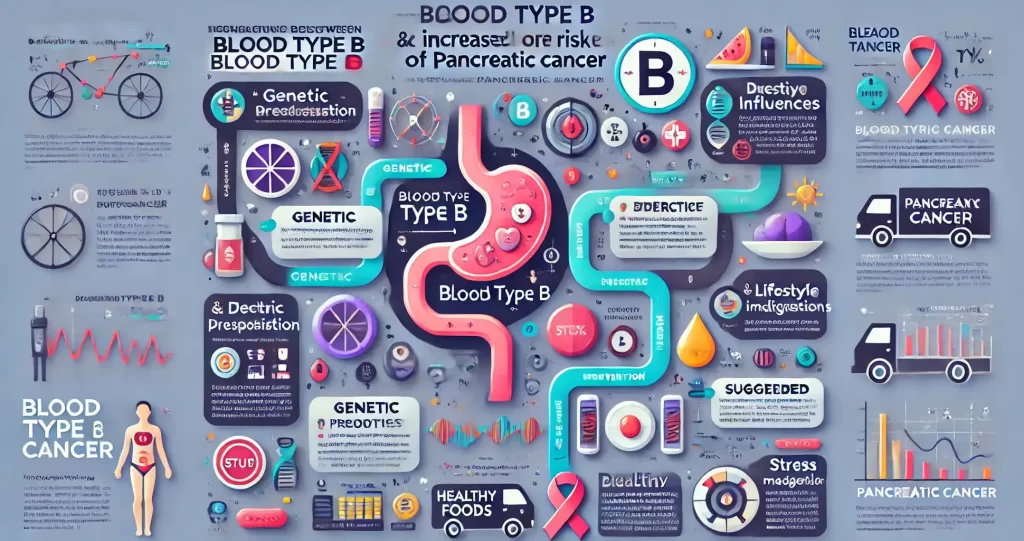
By understanding the specific risks associated with blood type B and implementing proactive health measures, individuals can significantly impact their overall health and potentially reduce their risk of pancreatic cancer.
Blood Type AB: Increased Lymphoma and Leukemia Risks
Individuals with blood type AB are known to have a unique set of characteristics due to their hybrid antigen profile (both A and B antigens). This unique genetic makeup places them at a heightened risk for certain types of cancers, including lymphoma and leukemia.
Why Type AB Is at Higher Risk for Certain Cancers:
- Genetic Factors: The presence of both A and B antigens in blood type AB may complicate the immune system’s response mechanisms. This could potentially lead to less effective surveillance and elimination of abnormal cells, thereby increasing cancer risk.
- Immunological Response: Blood type AB’s complex antigen profile might impact the efficiency of the immune system. Studies suggest that these individuals could have a varied response to inflammation and infection, conditions that are often associated with increased cancer development, particularly in the lymphatic system.
Prevention Strategies Through Diet and Lifestyle: Given the increased risks associated with blood type AB, adopting preventive measures through diet and lifestyle changes is crucial.
- Dietary Adjustments:
- Increase Antioxidant Intake: Consuming a diet rich in antioxidants can help combat oxidative stress and reduce inflammation, both of which are linked to cancer. Foods high in antioxidants include berries, nuts, and green leafy vegetables.
- Limit Red Meat and Processed Foods: These foods are associated with a higher risk of several types of cancer, including lymphoma. Opting for plant-based proteins and whole foods can reduce this risk.
- Incorporate Omega-3 Fatty Acids: Foods rich in omega-3 fatty acids, like fish and flaxseeds, have been shown to reduce inflammation and could potentially lower cancer risk.
- Lifestyle Modifications:
- Regular Exercise: Engaging in regular physical activity helps maintain a healthy immune system, which is crucial in fighting off diseases including cancer.
- Stress Reduction: Chronic stress can weaken the immune system and affect the body’s ability to fight cancer. Techniques such as yoga, meditation, and mindfulness can be effective in managing stress.
- Adequate Sleep: Ensuring sufficient sleep is vital for immune health. Sleep deprivation can lead to inflammation and a weakened immune response, increasing cancer risk.
Regular Medical Screening:
- Early detection plays a crucial role in the successful treatment of lymphoma and leukemia. Regular check-ups and blood tests can help catch these diseases early, when they are most treatable.
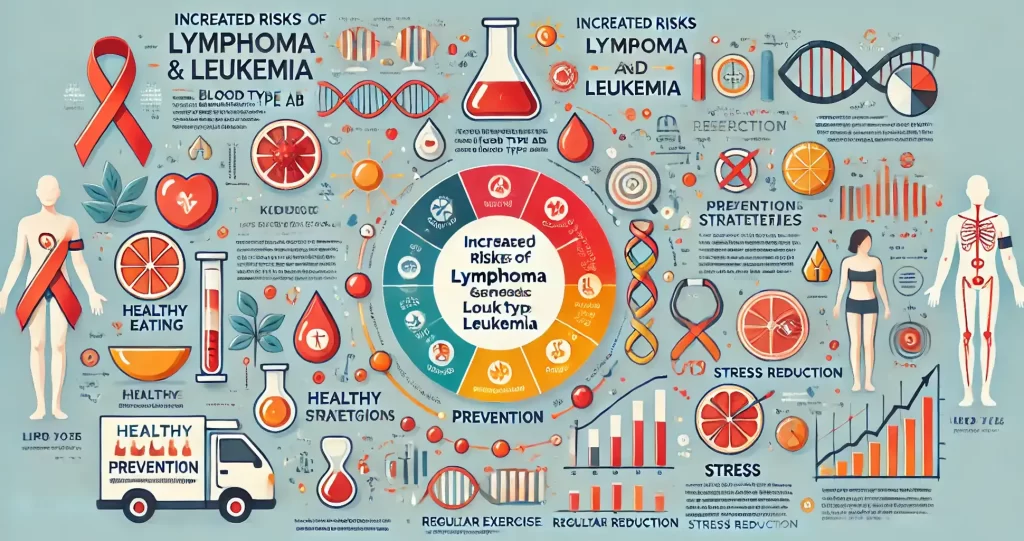
By understanding the specific risks associated with blood type AB and implementing these preventive measures, individuals can better manage their health and potentially reduce their risk of developing lymphoma and leukemia.
Anomalies and Exceptions
While the link between blood types and cancer risks provides valuable insights, it’s crucial to recognize the exceptions to these general patterns. The complexity of cancer risks involves a dynamic interplay of genetic, environmental, and lifestyle factors, making the relationship far from straightforward.
Understanding the Complexity of Cancer Risks: Cancer is influenced by a multitude of factors beyond just one’s blood type. Genetic predispositions might set the stage, but environmental exposures, lifestyle choices, and even random cellular changes can all contribute to cancer development. For example, even if individuals with blood type A are generally at higher risk for stomach cancer, not all will develop the disease; similarly, those with supposedly lower risk blood types can still be diagnosed with it. This variability underscores the limitations of generalizing cancer risks based solely on blood type.
The Role of Anomalies and Exceptions:
- Anomalies in Genetic Expression: Sometimes, individuals exhibit unusual genetic expressions that do not fit typical patterns, which can alter their susceptibility to diseases, including cancer.
- Environmental and Lifestyle Influences: Even within the same blood type, differences in environment, diet, and physical activity can significantly alter cancer risk profiles. For instance, exposure to carcinogens or adoption of a healthy lifestyle can override some genetic predispositions.
Importance of Personalized Medicine: Given the exceptions and anomalies in cancer risks associated with blood types, personalized medicine becomes essential. Personalized medicine tailors prevention, screening, and treatment plans to individual characteristics, including their genetic profile, lifestyle, and environmental exposures. This approach not only enhances the effectiveness of treatments but also minimizes potential side effects and improves overall healthcare outcomes.
Key Points in Personalized Medicine:
- Tailored Screening Programs: Based on an individual’s genetic makeup and other risk factors, screening programs can be customized to detect cancer early when it is most treatable.
- Customized Treatment Plans: Treatments can be designed to work best with a person’s specific biological makeup, increasing the efficacy of the response to cancer therapy.
- Preventive Strategies: Lifestyle modifications and preventive measures can be advised based on a person’s unique risk profile, helping to reduce the likelihood of developing cancer.
Preventive Measures and Lifestyle Choices
Adapting lifestyle and dietary habits according to one’s blood type can play a crucial role in minimizing cancer risk and promoting overall health. This personalized approach to health care emphasizes the importance of understanding one’s body and its unique needs based on genetic markers like blood type.
Adjusting Lifestyle and Diet According to Blood Type:
- Blood Type A: Individuals with this blood type may benefit from a primarily vegetarian diet, rich in organic fruits and vegetables, to mitigate their higher risk of stomach cancer. Stress management techniques such as yoga and meditation are also recommended due to their susceptibility to stress-related ailments.
- Blood Type B: Those with blood type B should balance their meat intake with plenty of fresh vegetables and avoid consuming chicken and corn, which can lead to metabolic issues. Regular moderate exercise, like hiking or cycling, can help manage weight and reduce stress.
- Blood Type AB: People with type AB should include foods like green vegetables, tofu, and seafood in their diet to combat their predisposition to stomach cancer. They should avoid caffeine and alcohol, especially in stressful situations, as they are more sensitive to these substances.
- Blood Type O: High-protein diets rich in lean meats, poultry, and fish, combined with vigorous exercise, work well for individuals with this blood type. They should limit simple carbohydrates and dairy products to prevent inflammation and other health issues.
Tips on Maintaining a Balanced and Healthy Lifestyle:
- Regular Exercise: Each blood type benefits from specific types of exercise; for instance, high-intensity activities may suit type O, while more calming exercises like yoga might be better for type A.
- Dietary Choices: Eating according to one’s blood type not only supports digestive health but can also influence overall immune function and energy levels.
- Stress Management: Effective stress management is crucial for all blood types but particularly for types A and AB, who may have higher stress sensitivity.
- Regular Health Screenings: Early detection of any health issues, including cancer, significantly increases the effectiveness of treatment. Regular screenings based on personal and family medical history are vital.
Preventive Measures for General Well-being:
- Hydration and Sleep: Adequate water intake and sufficient sleep are fundamental for maintaining optimal health and supporting the immune system.
- Avoid Smoking and Limit Alcohol Consumption: These habits are critical risk factors for various cancers and should be avoided or minimized across all blood types.
Case Studies and Real-Life Examples
Understanding one’s blood type and its implications can significantly influence health outcomes, especially in relation to cancer risk. Here are some real-life examples of individuals who have managed or altered their cancer risk through an awareness of their blood type.
Case Study 1: John, Blood Type A
- Background: John, a 54-year-old male with blood type A, learned about his increased risk for stomach cancer through genetic screening.
- Intervention: He altered his diet to include more whole grains and vegetables and reduced his intake of red meat. He also began a regimen of regular endoscopic screenings.
- Outcome: Early detection of precancerous changes allowed for timely treatment, significantly reducing his cancer risk.
Case Study 2: Lisa, Blood Type B
- Background: Lisa, a 45-year-old female with blood type B, was aware of her heightened risk for pancreatic cancer.
- Intervention: She opted for a balanced diet, cutting down on processed foods and increasing her intake of fruits and vegetables. She also incorporated regular exercise into her lifestyle.
- Outcome: Lisa has maintained a healthy weight and normal pancreatic function, with regular check-ups showing no signs of disease.
Case Study 3: Alex, Blood Type AB
- Background: Alex, a 60-year-old male, knew that his blood type AB put him at a higher risk for lymphoma.
- Intervention: He focused on reducing stress through meditation and yoga, adjusted his diet to reduce inflammatory foods, and engaged in regular lymphatic health assessments.
- Outcome: These proactive measures have helped Alex maintain a strong immune system and reduce factors that could trigger lymphoma.
Case Study 4: Emma, Blood Type O
- Background: Emma, a 38-year-old female, understood that her blood type O was associated with a lower risk of many cancers but a higher risk of ulcers that could lead to gastric cancer.
- Intervention: Emma adopted a diet low in acidic and spicy foods and began a preventive screening regimen.
- Outcome: Emma’s careful management has prevented the development of ulcers and maintained her overall gastric health.
These cases illustrate how personalized interventions based on blood type can effectively manage and sometimes reduce cancer risk. Each individual took proactive steps tailored to their genetic predispositions, demonstrating the potential benefits of personalized medicine.
Expert Opinions and Medical Advice
The connection between blood type and cancer risk has intrigued medical professionals for years. Insights from oncologists and hematologists have provided a deeper understanding of how genetic factors related to blood type can influence cancer susceptibility. Here, we explore expert opinions and gather advice from medical professionals on this intriguing topic.
Insights from Medical Experts:
- Dr. Helen Torres, Oncologist: “The link between blood types and cancer isn’t direct but rather part of a complex interplay of genetics and environment. For example, blood type A individuals might have a slightly higher risk for certain gastric cancers, likely due to interactions between their blood type antigens and the immune system’s response to pathogens like H. pylori.”
- Dr. Rajiv Desai, Hematologist: “Understanding a patient’s blood type is crucial in personalized medicine. It can help us predict vulnerabilities and tailor prevention strategies, such as more frequent screenings for blood type A patients in terms of stomach cancer.”
- Dr. Emily Chen, Oncological Researcher: “While blood type alone won’t determine your cancer risk, it can contribute to a more comprehensive risk profile, aiding in early detection and prevention strategies. It’s a piece of the puzzle that can lead to better patient outcomes when combined with other risk factors.”
Quotes from Medical Professionals:
- “Blood type information can enhance our understanding but should be integrated with other data for a holistic approach to cancer prevention.” – Dr. Simon Clarke, Cancer Specialist
- “We’re only scratching the surface of what blood type-related biomarkers can tell us about cancer risks. Ongoing research is vital.” – Dr. Laura Kim, Hematologist
- “Personalized healthcare, which considers blood type as a factor, could revolutionize how we approach cancer prevention and treatment.” – Dr. Michael Grant, Oncologist
Medical Advice Based on Blood Type:
- For Type A: Increased surveillance for stomach cancer, including regular endoscopy exams.
- For Type B: Monitoring for signs of pancreatic and liver issues, with regular imaging tests.
- For Type AB: Vigilance for symptoms of blood-related cancers like lymphoma, with frequent blood tests.
- For Type O: Focus on gastrointestinal health and regular screenings for gastric issues.
These expert views underscore the importance of integrating blood type knowledge into broader medical practices, highlighting the need for further research and a tailored approach to cancer prevention and treatment.
FAQs on Blood Type and Cancer Risk
Understanding the connection between blood type and cancer risk raises many questions. Here, we address some common queries and misconceptions to clarify how blood types might influence cancer risks.
Q1: Does having a certain blood type mean I will definitely develop cancer?
- A: No, having a certain blood type does not guarantee cancer development. While some blood types are associated with a higher or lower risk of specific cancers, many other factors like genetics, lifestyle, and environmental exposures also play significant roles.
Q2: Can changing my diet based on my blood type prevent cancer?
- A: While no diet can prevent cancer outright, adapting your diet according to your blood type may help reduce certain risks. For example, individuals with blood type A might benefit from a diet rich in fruits and vegetables to lower their stomach cancer risk.
Q3: Is the blood type-cancer connection supported by scientific research?
- A: Yes, several studies, including population-based research like the Shanghai Study, have found correlations between blood type and cancer risks. However, these studies emphasize that blood type is only one factor among many that contribute to cancer risk.
Q4: Should I get screened for cancer more often if I have a high-risk blood type?
- A: It may be beneficial. For example, if you have blood type A, which is associated with a higher risk of stomach cancer, regular screenings like endoscopies can be advantageous. Discuss personalized screening options with your healthcare provider.
Q5: Are people with blood type O really at a lower risk for cancer?
- A: Blood type O is associated with a lower risk of certain cancers, such as pancreatic and gastric cancers, but this does not mean they are at low risk for all cancers. Lifestyle and environmental factors are also crucial in determining individual cancer risk.
Q6: How can I use my knowledge of blood type to manage my health?
- A: Knowing your blood type can help tailor preventive measures, dietary choices, and possible screening strategies. It’s part of a broader personal health management approach that should include regular medical check-ups and a healthy lifestyle.
Conclusion
As we conclude our exploration of the blood type-cancer connection, it’s essential to recap the key points discussed and reflect on their implications for personalized health management.
Key Points Discussed:
- Blood Type and Cancer Risk: Different blood types may be predisposed to various cancer risks, with type A being more susceptible to stomach cancer, type B to pancreatic cancer, type AB to blood-related cancers, and type O having a mixed risk profile.
- Role of Genetics and Lifestyle: While genetics play a crucial role in determining cancer risk related to blood types, lifestyle and environmental factors are equally important.
- Personalized Prevention Strategies: Tailoring diet, exercise, and preventive screening based on blood type can help mitigate the associated cancer risks.
- Importance of Awareness and Education: Understanding the nuances of how blood type affects cancer risk is vital for informed health decisions.
Encouragement for Personalized Medical Consultation: It’s important for each individual to consult with healthcare providers to understand better the unique aspects of their health related to their blood type. Personalized medical advice is crucial because it considers your complete health profile, including family history, lifestyle, and other risk factors, beyond just your blood type.
Final Thoughts: We encourage everyone to engage actively with their health care providers, seek personalized advice, and consider their blood type as one of many factors in their overall health strategy. Proactive health management, including regular screenings and a healthy lifestyle, remains key to reducing cancer risk and promoting long-term health.
Ressources
Blood Type Specific Risks: Research, such as the findings from the Shanghai Cohort Study and other significant studies, supports the notion that certain blood types may have increased risks for specific types of cancers. For instance, non-O blood types have been linked with a higher incidence of pancreatic cancer
Genetic and Biological Mechanisms: The mechanisms by which blood types may influence cancer risks include genetic factors and the presence of certain enzymes and antigens that affect cellular processes and immune responses. For example, variations in digestive enzymes associated with blood types may influence cancer risks by affecting intestinal flora and the immune system
Sciencenorway – Science News from Norway.
Importance of Personalized Medicine: The insights gained from studying the blood type-cancer link underscore the importance of personalized medicine. By considering an individual’s blood type, along with other genetic, lifestyle, and environmental factors, healthcare providers can tailor prevention and treatment strategies more effectively.
Continued Research and Education: Ongoing research is crucial for deepening our understanding of how blood type affects cancer risk and for developing more effective strategies for cancer prevention and treatment.
Consultation with Healthcare Providers: It is essential for individuals to consult with healthcare providers for personalized advice based on their unique health profiles. This approach ensures that prevention and treatment plans are as effective and tailored as possible.

